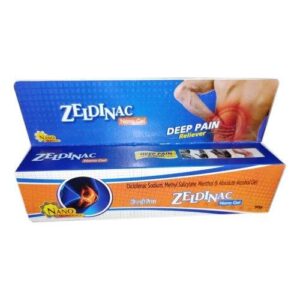DICLOFENAC + MENTHOL SALICYLATE
Diclofenac: Diclofenac is a nonsteroidal anti-inflammatory drug (NSAID) used to relieve pain, reduce inflammation, and treat conditions such as rheumatoid arthritis, osteoarthritis, ankylosing spondylitis, and acute gout. It is available in various forms including oral tablets, capsules, topical gel, and as an injection.
The mechanism of action of diclofenac involves inhibiting the enzyme cyclooxygenase (COX). COX plays a key role in the production of prostaglandins, which are inflammatory mediators that contribute to pain and swelling. By inhibiting COX, diclofenac reduces the formation of prostaglandins, thereby providing pain relief and reducing inflammation.
The appropriate dose of diclofenac varies depending on the condition being treated and the form of the medication. For oral tablets or capsules, the usual starting dose is 50 mg two or three times a day. However, the dose may be adjusted based on the individual’s response and tolerability. The maximum daily dose is generally 150-200 mg.
As for the topical gel, a thin layer of diclofenac gel is typically applied to the affected area four times a day. Avoid washing the treated area for at least one hour after application. The gel should not be used on broken or irritated skin.
Common side effects of diclofenac include stomach upset, heartburn, diarrhea, constipation, headache, dizziness, and drowsiness. More serious but rare side effects may include stomach ulcers, bleeding, allergic reactions, liver or kidney problems, and cardiovascular events such as heart attack or stroke. Long-term use of diclofenac or high doses can increase the risk of these adverse effects.
It is important to note that diclofenac should be used with caution in individuals with a history of gastrointestinal problems, cardiovascular disease, kidney or liver dysfunction, and those who are pregnant or breastfeeding. It is always advisable to consult a healthcare professional before starting or changing any medication regimen.
Menthol Salicylate: Menthol Salicylate is a topical analgesic that is often used for the temporary relief of minor aches and pains of muscles and joints. It is commonly found in various over-the-counter creams, ointments, and gels.
The mechanism of action of Menthol Salicylate involves its dual components. Menthol provides a cooling effect and has a local anesthetic effect, which helps to numb the area and reduce the sensation of pain. Salicylate, on the other hand, has anti-inflammatory properties and helps to reduce inflammation in the affected area.
Menthol Salicylate is typically applied directly to the skin over the painful area. The recommended dose and frequency may vary depending on the specific product being used, so it is important to carefully read and follow the instructions provided with the product.
As with any medication, Menthol Salicylate can cause side effects. Common side effects include skin irritation, such as redness, itching, or a burning sensation at the application site. Some individuals may also experience an allergic reaction, which can cause hives, rash, or difficulty breathing. It is important to discontinue use and seek medical attention if any severe or persistent side effects occur.
Additionally, Menthol Salicylate should not be applied to broken or damaged skin, as it may cause further irritation or increase the chances of systemic absorption. It is also advised to avoid contact with eyes, mucous membranes, and sensitive areas of the body.
It is important to note that Menthol Salicylate should not be used on children under the age of two years, as it may increase the risk of developing a life-threatening condition called Reye’s syndrome.
Before using Menthol Salicylate or any other topical analgesic, it is recommended to consult with a healthcare professional, especially if you have any underlying medical conditions or are taking any other medications.

